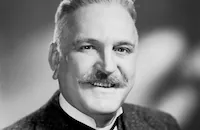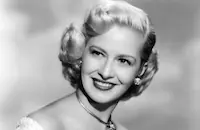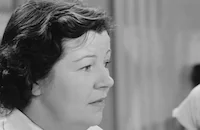Summer Holiday

Brief Synopsis
Cast & Crew
Rouben Mamoulian
Mickey Rooney
Gloria De Haven
Walter Huston
Frank Morgan
Butch Jenkins
Film Details
Technical Specs

Synopsis
In June, 1906, in the town of Danville, Connecticut, the Miller family--father Nat, mother Essie, sons Arthur, Richard and Tommy, daughter Mildred, Uncle Sid and cousin Lily--prepare for Richard's high school graduation. Uncle Sid is about to leave for a new position as a reporter on the Waterbury newspaper, and when he proposes to Lily once again, she agrees to marry him, on condition that he stop drinking. Meanwhile, Richard, who is attending Yale in the fall, tries to kiss his sweetheart, Muriel McComber, and practices his fiery, anti-capitalist valedictory speech. At graduation, newspaper owner Nat lets Richard recite only the first, inoffensive part of his speech before cutting him off. When Nat then offers his son a chance to drive the Stanley Steamer home, asking if his conscience will let him enjoy a consumer good purchased off the sweat of the workers, Richard gladly forgoes his Marxist philosophies. By the Fourth of July, however, some of the Millers have grown concerned that Richard is spending too much time reading his radical books. Although Essie is aghast, Nat supports Richard, knowing that he is merely going through a rebellious phase. As everyone makes their picnic plans, Uncle Sid reappears, and when Nat realizes that his brother-in-law has been fired, he pretends to suddenly need to re-hire him. Lily is overjoyed at Sid's return and, thinking he is now sober, wants him to propose again. At the town picnic that day, however, Sid wins the drinking contest and comes home inebriated. Meanwhile, Muriel's father, Dave McComber, visits Nat and accuses Richard of trying to corrupt his daughter with kisses and radical love letters. When McComber says that he refuses to let Muriel see Richard anymore, Nat throws him out, ignoring McComber's threats to pull his advertising from Nat's newspaper. Nat then confronts Richard, who calms his father by proclaiming his chaste love for Muriel. Nat gives Richard the letter McComber forced Muriel to write, which causes a distraught Richard to swear revenge. That night, Sid's drunken antics make everyone laugh except Lily, who cries. A still angry Richard storms out of the house and meets a college sophomore, who asks him to go out with him and two chorus girls. After Richard agrees, his worldy wise date, Belle, takes him to a bar and gets him drunk, then leaves him when he tries to reform her. When she tells the bartender who Richard's father is, the bartender fears he will lose his job, and so throws her out. She then seeks revenge by writing a letter to Nat informing him where Richard was, while at the same time Richard staggers home and is punished by his parents. The next day, Muriel asks Richard to meet her in secret, and they profess their undying love and kiss. When Richard comes home, his parents approve of his love-struck manner, though Nat is concerned about Belle's letter. As he haltingly attempts to talk to Richard about "the birds and the bees," Richard assures him that he only wants to be with Muriel, a good girl. Later that night, as Sid and Lily sit together on the porch swing, Richard waves across the street to Muriel, and Nat and Essie watch over everyone, reminiscing about their own love story.

Director

Rouben Mamoulian
Cast

Mickey Rooney

Gloria De Haven

Walter Huston

Frank Morgan

Butch Jenkins

Marilyn Maxwell

Agnes Moorehead

Selena Royle

Michael Kirby
Shirley Johns
Hal Hackett

Ann Francis

John Alexander
Virginia Brissac

Howard Freeman
Alice Mackenzie
Ruth Brady
Don Garner
Emory Parnell

Wally Cassell
Jack Baxley
Walter Soderling
Ann Kimbell
Jack Clifford
Charles Bates
Donald Mayo

Margaret Bert
Oliver Blake
Jack Lipson
Pete Cusanelli
Henry Sylvester
David Dunbar
Larry Lathrop

Helen Koford
Louise Colombet
Blanche Rose
Margaret Fealy
Nella Spaugh
Budd Fine
Francis Stevens
Audrey Betz
Crew
Albert Akst
Ralph Blane
Hugh Boswell
Irving Brecher
Jack Dawn
Herman Franzen
Arthur Freed
Cedric Gibbons
Frances Goodrich
Sydney Guilaroff
Albert Hackett
Lennie Hayton
Jean Holloway
Irene
Henri Jaffa
Natalie Kalmus
Frank B. Mackenzie
Mickey Marigold
Les Martinson
Richard Pefferle
Walter Plunkett
Charles Rosher
Conrad Salinger
John Schmitz
Charles Schoenbaum
Douglas Shearer
Jack Martin Smith
Charles Walters
Harry Warren
Edwin B. Willis
Denny Wilson
Wallace Worsley

Videos
Movie Clip



Trailer
Film Details
Technical Specs

Articles
Summer Holiday (1948)
A musical play, on the other hand, was "a story which will be told through the medium of integrated dialogue, songs, dance and music, with each of those elements taking an organic and vital part in the telling of that story. What happens in this case is that the dialogue scenes, which have been cut out of a good play, are not thrown overboard, but are actually translated into their musical equivalent of song and dance. As a result the story has not suffered, nor has it changed, but the manner of telling it has changed, and it has been enriched by added emotional values which the right kind of music brings."
Perhaps Mamoulian saw this as a good property to heavily stylize because it was already so widely known by the public. After all, the play, Ah, Wilderness!, Eugene O'Neill's famous piece of Americana about a family in 1906 Connecticut, first opened on Broadway in 1933 starring George M. Cohan, Gene Lockhart and Elisha Cook, Jr., and ran nearly 300 performances. The 1935 movie, directed by Clarence Brown, remains a classic. O'Neill himself said of his play, "My purpose was to write a play true to the spirit of the American large small-town at the turn of the century. Its quality depended upon atmosphere, sentiment, an exact evocation of the mood of a dead past." Qualities like "atmosphere," "sentiment" and "mood" are what Mamoulian was most interested in enhancing - in musical and visual terms. (Mamoulian got the chance to explain his approach to O'Neill while on a trip to New York, and the playwright, who was suffering from Parkinson's Disease, gave the film his blessing.)
Mamoulian had just taken four years away from Hollywood to work on Broadway, directing the original productions of Oklahoma! and Carousel so theatrical stylization was undoubtedly on his brain. For example, he had strong and specific ideas for the color scheme of the film: "I didn't want any contrasting colors," he said, "just tints within a very narrow chromatic range - various degrees of yellow, beige and green. This I considered to be the colors of 'Americana' - like Thomas Benton, John Curry and Grant Wood." When hearing of this plan, MGM art director Cedric Gibbons replied, "You can't do this here. Believe me, Rouben, you're wasting your time. [Louis B.] Mayer wants to see bright colors." Not accepting this response, Mamoulian called producer Arthur Freed to complain, then handed the phone to Gibbons. Gibbons listened to Freed, then hung up and said to Mamoulian, "You know, Rouben, I LOVE the idea."
The color idea extended to the costumes as well. Costume designer Walter Plunkett said, "For the opening scene he wanted a period feeling like Currier and Ives prints. So I eliminated colors from the dresses and suits of the characters to give them a washed and faded look."
Meanwhile, Mamoulian was working very closely with his songwriters, Harry Warren and Ralph Blane, telling them in one memo: "May I once more remind you to keep in mind the importance of phraseology and vocabulary in any dialogue or lyrics added to O'Neill's writing...They should sound as if they were O'Neill's - lyrics O'Neill could write if he would, or perhaps if he could." Warren himself said that setting O'Neill to music was easy since O'Neill wrote in eight-bar phrases which came out "in cadence, like poetry."
Warren and Blane were known teasingly as the "transportation fellas" because Warren had written "Chattanooga Choo-choo" and "Atchison, Topeka and the Santa Fe," and Blane had written "The Trolley Song." For Summer Holiday they came up with yet another transport-themed title: "Stanley Steamer." Other songs include "Afraid to Fall in Love," "Our Home Town" and "The Sweetest Kid I Ever Met."
Summer Holiday was given an 'A' production by MGM, with a cast of Mickey Rooney, Gloria DeHaven, Frank Morgan and Walter Huston, and ultimately a 113-day shooting schedule and $2.2 million budget. Rooney had appeared in the movie Ah, Wilderness!, in the role of the youngest brother; here, he plays the oldest. (Ironically, the family's house in Summer Holiday is the same one that was used as the Hardys' home in all of the Andy Hardy films starring Rooney.)
Four songs written and/or filmed for Summer Holiday were ultimately left out. One of these, "Never Again," was prerecorded by a petrified Frank Morgan with Agnes Moorehead. After the first take, Roger Edens (Freed's right-hand man) said, "That's the worst singing I ever heard." Out the song went. The biggest deletion was an elaborate Persian fantasy sequence called "Omar and the Princess" which takes place in Mickey Rooney's imagination and reveals his love for Gloria DeHaven.
During pre-production, Mamoulian received a visit from a Breen Office censor regarding a scene where the father talks to his teenage son about sex. Mamoulian was adamant about keeping the scene, but the censor insisted that many individual words (such as "prostitute") had to go. The result was such a massacre of dialogue that Mamoulian came up with a clever, creative solution, cutting the ends of all sentences which contained "bad" phrases. "I had a new version written," he recalled, "in which the father finds himself embarrassed with the subject of sex to such an extent that he is never able to finish a sentence. And with that the matter would be made perfectly clear to the audience without the use of one single censorable word."
Filmed in mid-1946, Summer Holiday was not released until the spring of 1948 because the studio feared it would not perform well. Sure enough, critics dismissed it and so did the public: it lost $1.5 million at the box office. It's now regarded as a minor classic, however, largely because of Mamoulian's innovative approach. As author Tom Milne has written, "Summer Holiday equals [Mamoulian's earlier film] Love Me Tonight [1932] in the mastery with which rhymed dialogue, songs and leisurely action are swept up by Mamoulian's cutting into one dynamic overall rhythm....Mamoulian needs neither dances nor dancers to create choreography."
After Summer Holiday, Mamoulian took an even longer break from filmmaking; his next picture would be Silk Stockings in 1957 - coincidentally another musical remake of another classic film, Ninotchka (1939).
Producer: Arthur Freed
Director: Rouben Mamoulian
Screenplay: Frances Goodrich, Albert Hackett, Irving Brecher (adaptation), Jean Holloway (adaptation), Eugene O'Neill (play)
Cinematography: Charles Schoenbaum
Film Editing: Albert Akst
Art Direction: Cedric Gibbons, Jack Martin Smith
Cast: Mickey Rooney (Richard Miller), Gloria DeHaven (Muriel McComber), Walter Huston (Nat Miller), Frank Morgan (Uncle Sid), Jackie 'Butch' Jenkins (Tommy Miller), Marilyn Maxwell (Belle).
C-93m. Closed captioning.
By Jeremy Arnold
Sources:
Hugh Fordin, The World of Entertainment: Hollywood's Greatest Musicals
Tom Milne, Mamoulian

Summer Holiday (1948)
Quotes
Mankind was better off when lived in the Dark Ages. When everybody went around naked!- Richard Miller
Well, maybe so. But today it might interfere with your social life.- Uncle Sid
Trivia
Notes
The working title of this film was Ah, Wilderness. The film is a musical version of Eugene O'Neill's play Ah, Wilderness!" and the 1935 M-G-M (non-musical) film version of his play, which was written by Frances Goodrich and Albert Hackett. Goodrich and Hackett, who were credited with the screenplay of the 1948 film, wrote only the screenplay of the 1935 version. The title of O'Neill's play was derived from a line in the poem "The Rubáiyát of Omar Khayyám." A January 1946 Hollywood Reporter news item notes that June Allyson and Ray McDonald were set to star in the film. Although Summer Holiday did not mark the motion picture debut of actress Anne Francis, it marked her first onscreen credit, which listed her as "Ann Francis." Francis' debut was in the 1947 M-G-M production This Time for Keeps (see below). Hollywood Reporter production charts indicate that Charles Schoenbaum replaced Charles Rosher as the director of photography approximately two weeks after the film went into production. Although a news item in Hollywood Reporter on July 10, 1946 indicated that film editor Albert Akst was being replaced by George White, Akst remained on the film. Some filming took place at Irvine Park and Busch Gardens near Pasadena, CA. According to a February 1948 Daily Variety news item, the final cost of the film was approximately $2,000,000. Modern sources note that production on the film was hampered by a two-week motion picture industry strike that began on June 22, 1946. During the strike, Mamoulian suspended full production on the film and used the time to rehearse scenes and pre-record musical numbers.
A biography of producer Arthur Freed credits Robert Tucker and Ralph Blane with the vocal arrangements, and notes that the song "Wish I Had a Braver Heart," sung by Gloria De Haven, was cut from the film before its release. Also cut from the picture was the first rendition of Walter Huston singing "Spring Isn't Everything." Although the film was completed in mid-October 1946, it was not released until May 1948. Modern sources note that the film's release was held up due to M-G-M's concerns that it would not do well at the box office. The picture lost nearly $1,500,000 in its initial release.
O'Neill's play was first produced by The Theatre Guild in New York in 1933 with George M. Cohan playing "Nat Miller." The role was subsequently played by Will Rogers and Harry Carey. In addition to the 1935 film version of O'Neill's play, which was directed by Clarence Brown and starred Wallace Beery, Lionel Barrymore, Aline MacMahon and Mickey Rooney, as "Tommy Miller," (see AFI Catalog of Feature Films, 1931-40; F3.0045), the play was presented in several television broadcasts, including a Celanese Theatre production, televised on ABC on October 3, 1951, which was directed by Alex Segal and starred Thomas Mitchell and Roddy McDowell; a Front Row Center production, televised on CBS on June 5, 1951, which was directed by Fletcher Markle and starred Leon Ames and Bobby Driscoll; and a Theatre in America Production, televised on PBS on October 13, 1976, which was directed by Arvin Brown and starred William Swetland and Richard Backus.















